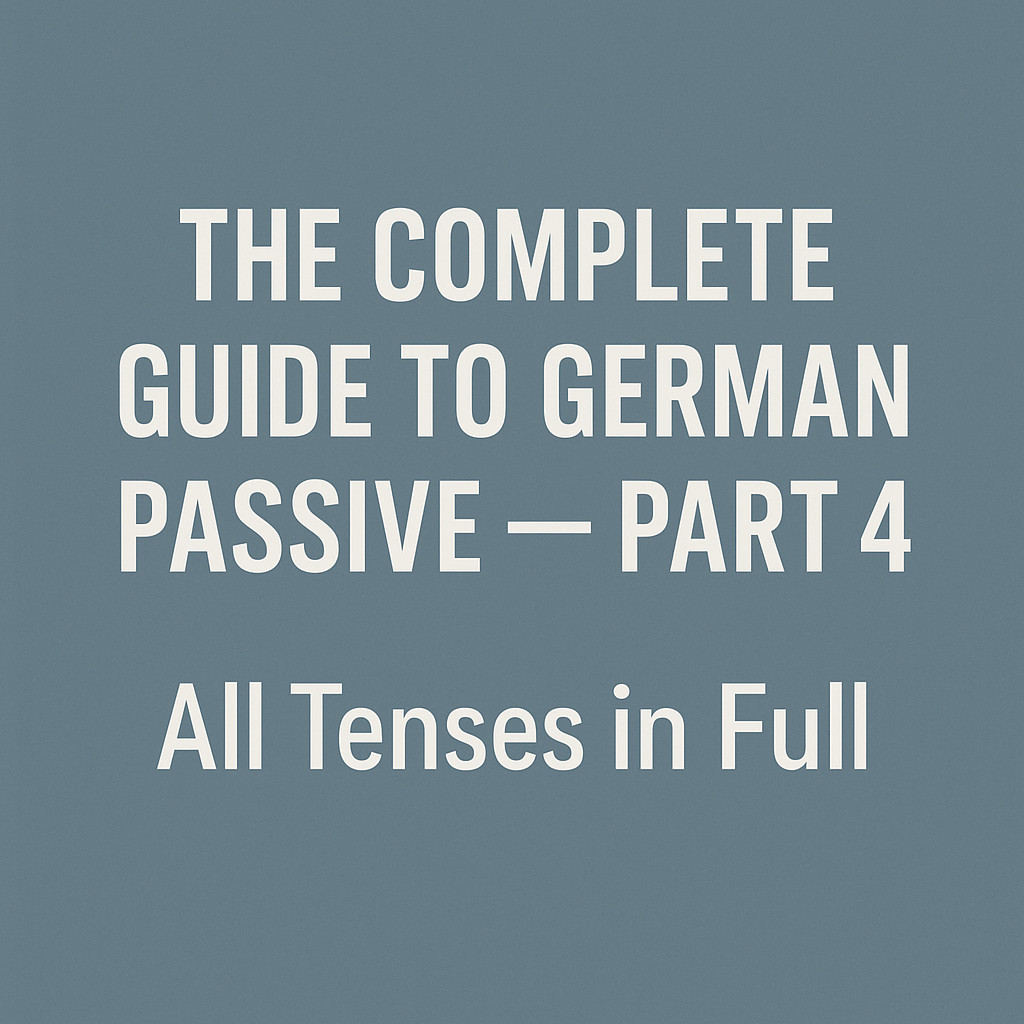All Tenses in Full (with Modals), plus every trap and edge case
“Know the norm. Understand the logic. Use both wisely.” - Тимур Левітін
Before we start: the paradox nobody explains
Two ways to describe the same idea (“the car could be repaired”):
- Logical but uncodified (not accepted in exams):
Das Auto ist repariert werden können.
Uses sein for passive and the modal rule (werden können). Nothing in Duden explicitly bans this. It’s simply not codified. - Exam-safe norm (what handbooks enforce):
Das Auto hat repariert werden können.
Here, haben is borrowed from modal tradition. This is the only “correct” form you’ll see in exam prep.
Why “worden können” is rejected:
❌ Das Auto ist repariert worden können.
worden is the perfect-passive marker without modals. When a modal + another infinitive is present, the rule is: replace participle with infinitive → werden könnenа не worden können.
1) Baseline passive (no modal): all tenses
- Präsens — Das Auto wird repariert. → “The car is being repaired / is repaired.”
- Präteritum — Das Auto wurde repariert. → “The car was repaired.”
- Perfekt — Das Auto ist repariert worden. → “The car has been repaired.”
- Plusquamperfekt — Das Auto war repariert worden. → “The car had been repaired.”
- Futur I — Das Auto wird repariert werden. → “The car will be repaired.”
- Futur II — Das Auto wird repariert worden sein. → “The car will have been repaired.”
2) Passive with a modal (können): all tenses
| Tense | German form | Переклад на англійську мову |
|---|---|---|
| Präsens | Das Auto kann repariert werden. | The car can be repaired. |
| Präteritum | Das Auto konnte repariert werden. | The car could be repaired. |
| Perfekt (norm) | Das Auto hat repariert werden können. | The car was able to be repaired. |
| Plusquamperfekt (norm) | Das Auto hatte repariert werden können. | The car had been able to be repaired. |
| Futur I | Das Auto wird repariert werden können. | The car will be able to be repaired. |
| Futur II | Das Auto wird repariert worden sein können. | The car will have been able to be repaired. |
3) Subordinate clauses and verb clusters
In subordinate clauses, the operator follows its operand. That’s why long clusters pile up at the end:
- …, dass das Auto repariert worden sein können wird.
Word-order rules are documented in IDS-Grammis (“Stellungsfelder und Satzklammer”).
4) The three big pitfalls
A — “worden können” vs “werden können"
- ❌ ist repariert worden können (not allowed)
- ✅ ist repariert werden können (logical but not codified)
- ✅ hat repariert werden können (exam norm)
B — Why haben in Perfekt/Plusquamperfekt but sein in Futur II?
- Perfekt/Plusquamperfekt: modal rule dominates → haben.
- Futur II: passive scaffold dominates → sein (worden sein).
C — Misinterpretation (“the car fixed itself”)
Surface hat … können looks “active,” but the complement is passive (repariert werden). Meaning always: repaired by someone else.
5) Edge cases and alternatives
- Passiversatz with lassen:
Das Auto lässt sich reparieren. ≈ Das Auto kann repariert werden. - Impersonal passive:
Es muss repariert werden. - Permission vs possibility:
… werden dürfen (may be repaired) vs … werden können (can be repaired). - Konjunktiv:
Es könnte repariert werden. / Es wäre repariert worden sein können.
6) Exam survival
- Always write in exams:
- Perfekt: hat repariert werden können
- Plusquamperfekt: hatte repariert werden können
- Futur II: wird repariert worden sein können
- If challenged:
Point to Duden — Ersatzinfinitiv. It says: do not use the participle of a modal if another infinitive is present; use an infinitive instead. It does не prescribe “mit haben.” - Other references:
- IDS-Grammis (Ersatzinfinitiv, Perfekt-paradigm)
- Wikipedia (Ersatzinfinitiv)
- DeutscheGrammatik20 (teaching tables with haben)
Mention them as sources — but keep only Duden linked.

Series navigation
- Part 1: The Myth of Three Passive Forms
- Part 2: Passive Tenses Without Modals
- Part 3: Passive with Modal Verbs
- Part 4: All Tenses in Full (this page)
- Part 5: Recipient Passive
- Part 6: Impersonal Passive
- Part 7: Passive in Konjunktiv
- Part 8: Academic Passive
- Part 9: The Translation Lab
- Part 10: Survival Strategies
About the author
Тимур Левітін — Founder, Head Teacher & Translator
Author’s rights
© Tymur Levitin — Levitin Language School / Start Language School by Tymur Levitin
Глобальне навчання. Персональний підхід.
























